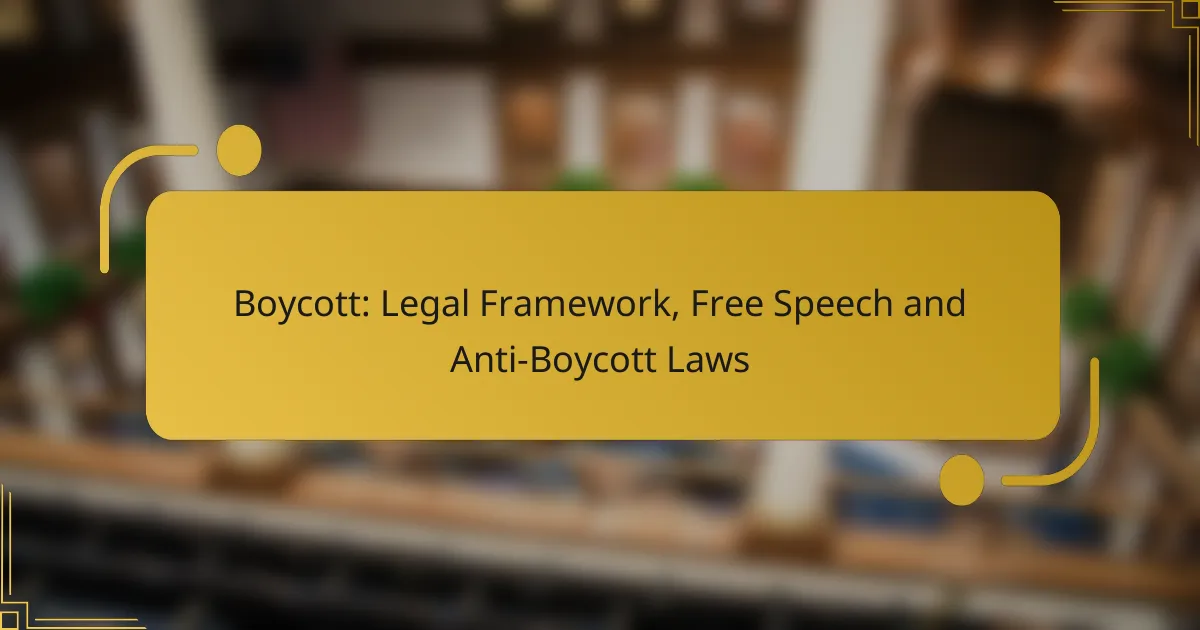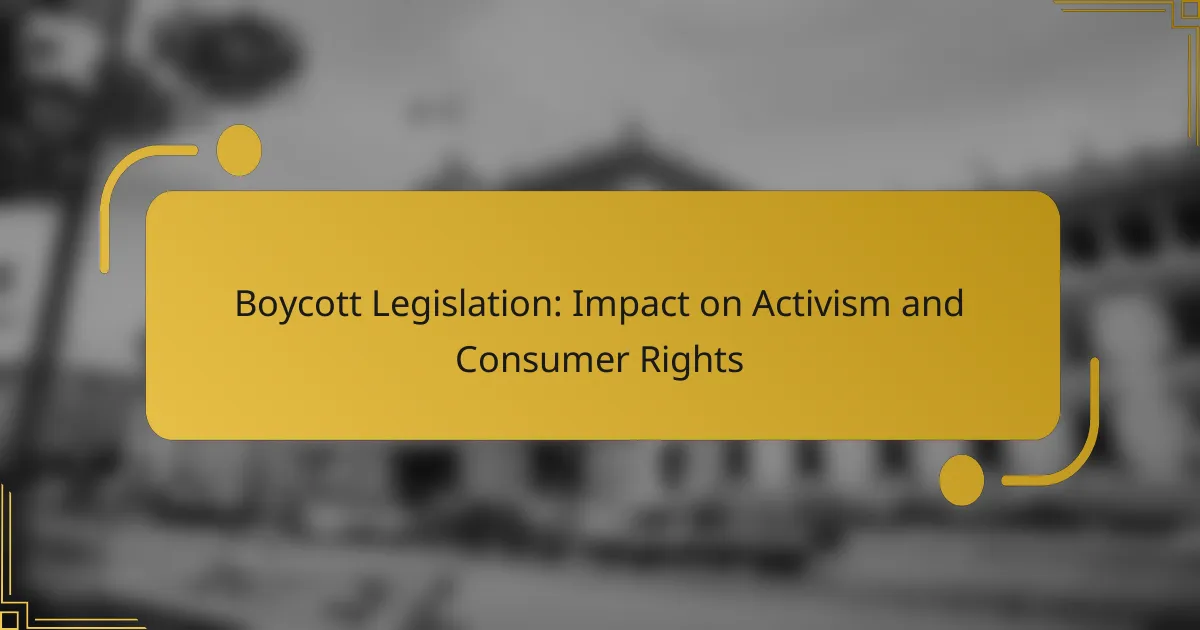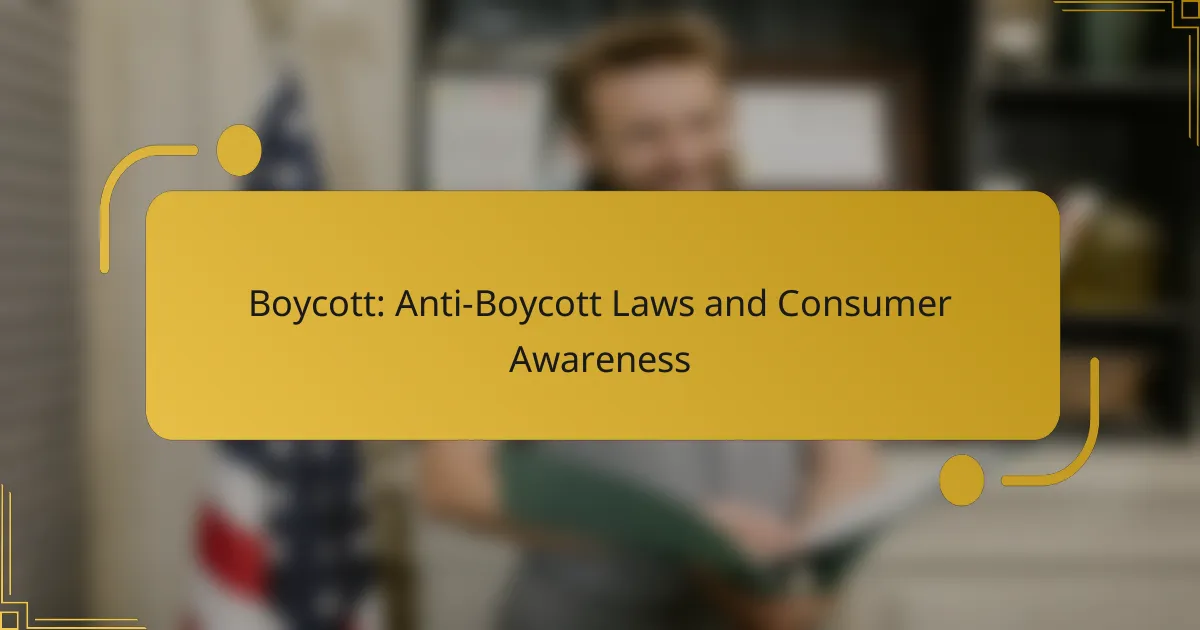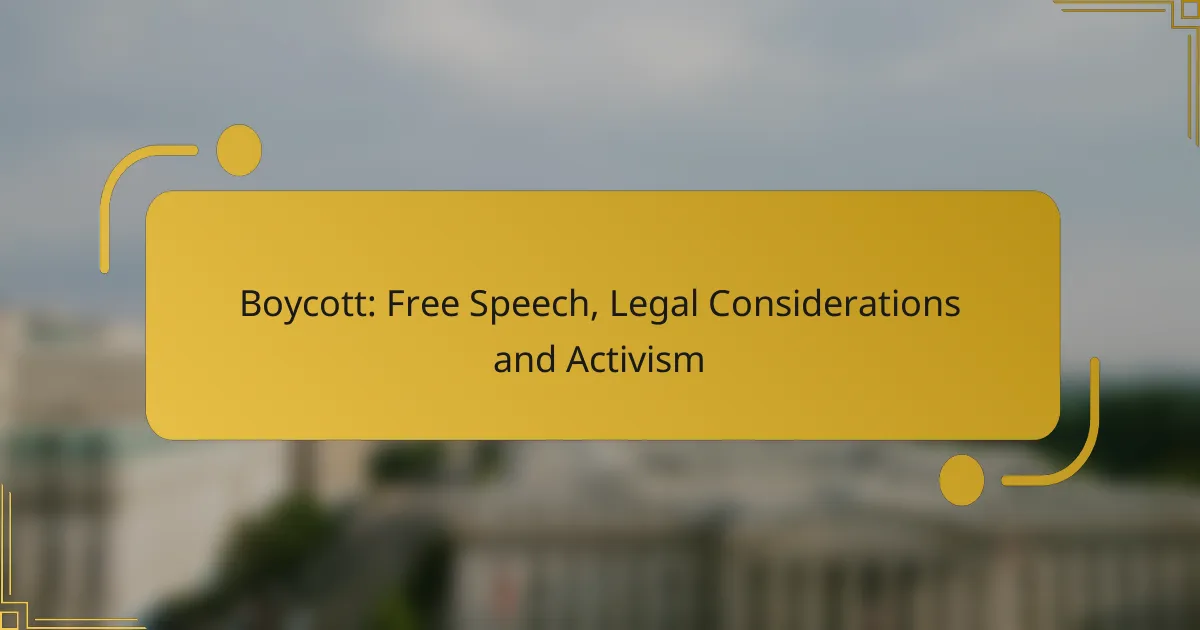The legal frameworks governing boycotts in the United States involve a complex interplay of federal, state, and international laws that influence how individuals and organizations can participate in such actions. Anti-boycott laws, in particular, pose challenges to free speech by imposing penalties on those who engage in boycotts for political or social reasons, raising important questions about the balance between economic interests and the right to express dissent. As a result, boycotts can have significant repercussions for businesses, affecting their sales, brand reputation, and overall legal standing.

What are the legal frameworks for boycotts in the United States?
The legal frameworks for boycotts in the United States encompass a mix of federal, state, and international regulations. These laws can affect how individuals and organizations engage in boycotts, particularly concerning free speech and anti-boycott measures.
Federal laws governing boycotts
At the federal level, the primary laws governing boycotts include the Export Administration Act and the antiboycott provisions of the Internal Revenue Code. These laws prohibit U.S. persons from participating in foreign boycotts that the U.S. government does not endorse, particularly those aimed at Israel.
Violating these federal laws can lead to significant penalties, including fines and loss of export privileges. Businesses must be aware of these regulations when considering participation in any boycott that may have international implications.
State-specific anti-boycott laws
Many U.S. states have enacted their own anti-boycott laws, particularly targeting boycotts against Israel. These laws often require state contractors to certify that they do not engage in such boycotts, and violations can result in contract termination or loss of state funding.
States like Texas and Florida have implemented stringent measures, making it essential for businesses operating in these areas to understand their obligations. Failure to comply can lead to legal challenges and financial repercussions.
International boycott regulations
Internationally, various countries have their own regulations regarding boycotts, which can intersect with U.S. laws. For example, the European Union has guidelines that may conflict with U.S. anti-boycott laws, particularly in trade relations.
Companies engaged in international trade must navigate these complex regulations carefully. Understanding the legal landscape in both the U.S. and foreign jurisdictions is crucial to avoid legal pitfalls and ensure compliance with all applicable laws.
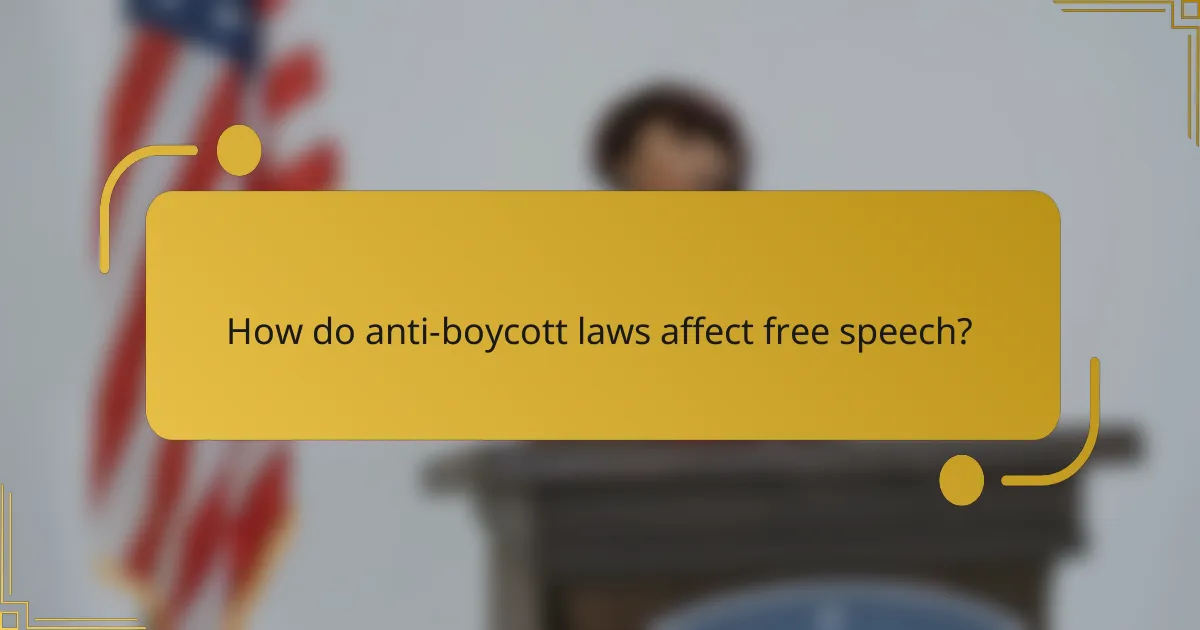
How do anti-boycott laws affect free speech?
Anti-boycott laws can restrict free speech by penalizing individuals or organizations that participate in boycotts against certain entities, often based on political or social issues. These laws raise complex questions about the balance between protecting economic interests and upholding the right to free expression.
First Amendment implications
The First Amendment protects free speech, but anti-boycott laws challenge this protection by imposing penalties for certain expressive actions. Courts have grappled with whether these laws infringe on constitutional rights, particularly when boycotts are motivated by political beliefs or social justice concerns.
In several cases, courts have ruled that while states can regulate economic activity, they cannot unduly restrict free speech. This ongoing legal debate highlights the tension between state interests and individual rights, making it crucial for activists and businesses to understand their rights under the First Amendment.
Case studies on free speech and boycotts
One notable case involved a state law that penalized companies for participating in boycotts against Israel. Courts found that such laws could infringe on free speech rights, as they effectively punish individuals for their political beliefs. This case illustrates the potential legal challenges that anti-boycott laws face when they intersect with First Amendment protections.
Another example is the backlash against companies that have chosen to boycott certain products or services based on ethical considerations. These instances often lead to public debates about the role of corporate responsibility and the extent to which businesses can express their values without facing legal repercussions.
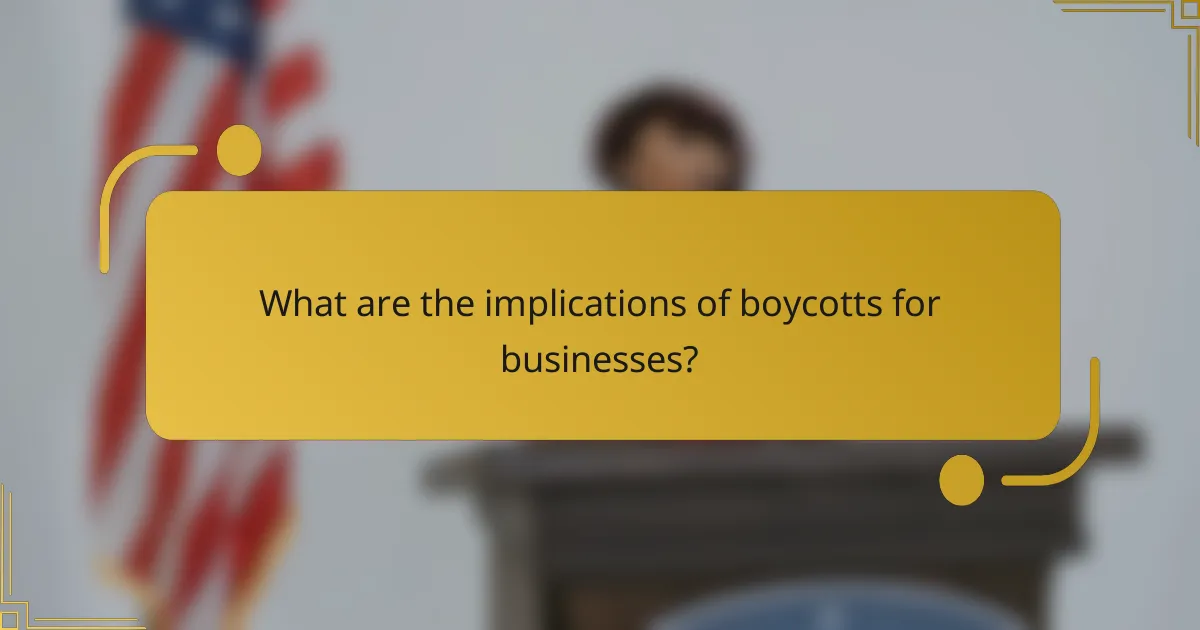
What are the implications of boycotts for businesses?
Boycotts can significantly impact businesses by affecting their sales, brand image, and legal standing. Companies may face financial losses and reputational damage as consumers choose to withdraw their support based on ethical or political grounds.
Legal risks for companies
Businesses engaging in or affected by boycotts may encounter various legal risks, particularly if they are perceived to be violating anti-boycott laws. In some jurisdictions, such as the United States, companies could face penalties for participating in boycotts that are deemed discriminatory or politically motivated.
Additionally, companies may need to navigate complex regulations regarding free speech and commercial practices. Legal challenges can arise if a business retaliates against employees or customers who support a boycott, potentially leading to lawsuits or regulatory scrutiny.
Reputational impacts of boycotts
The reputational impact of boycotts can be profound, as public perception often shapes consumer behavior. A business that is the target of a boycott may experience a decline in customer loyalty and trust, which can take years to rebuild.
On the other hand, companies that proactively address the issues prompting a boycott may enhance their reputation. Engaging in transparent communication and demonstrating commitment to social responsibility can mitigate negative perceptions and even attract new customers who value ethical practices.
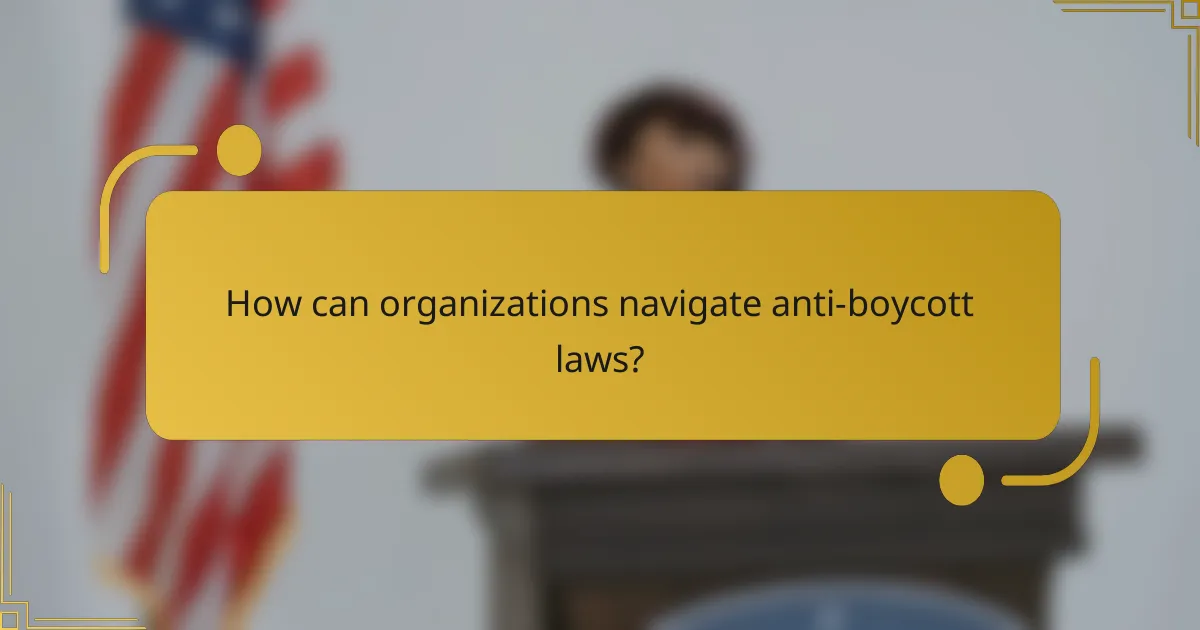
How can organizations navigate anti-boycott laws?
Organizations can navigate anti-boycott laws by understanding the specific regulations that apply to their operations and ensuring compliance with them. This involves being aware of the legal frameworks that govern boycotts and implementing strategies to avoid potential violations.
Compliance strategies for businesses
Businesses should start by conducting a thorough review of applicable anti-boycott laws in their jurisdiction, which may include federal, state, or local regulations. This review should identify any specific prohibitions against participating in boycotts that target certain countries or entities.
Establishing a compliance program is crucial. This program should include training for employees on the legal implications of boycotts, clear guidelines on acceptable practices, and a reporting mechanism for potential violations. Regular audits can help ensure adherence to these guidelines.
Best practices for advocacy groups
Advocacy groups should focus on educating their members about the legal landscape surrounding boycotts. Providing resources and training on the implications of anti-boycott laws can empower members to make informed decisions while engaging in advocacy efforts.
Additionally, advocacy groups can collaborate with legal experts to develop strategies that align their campaigns with legal requirements. This may include seeking legal opinions before launching boycott initiatives and ensuring that messaging does not inadvertently violate anti-boycott laws.
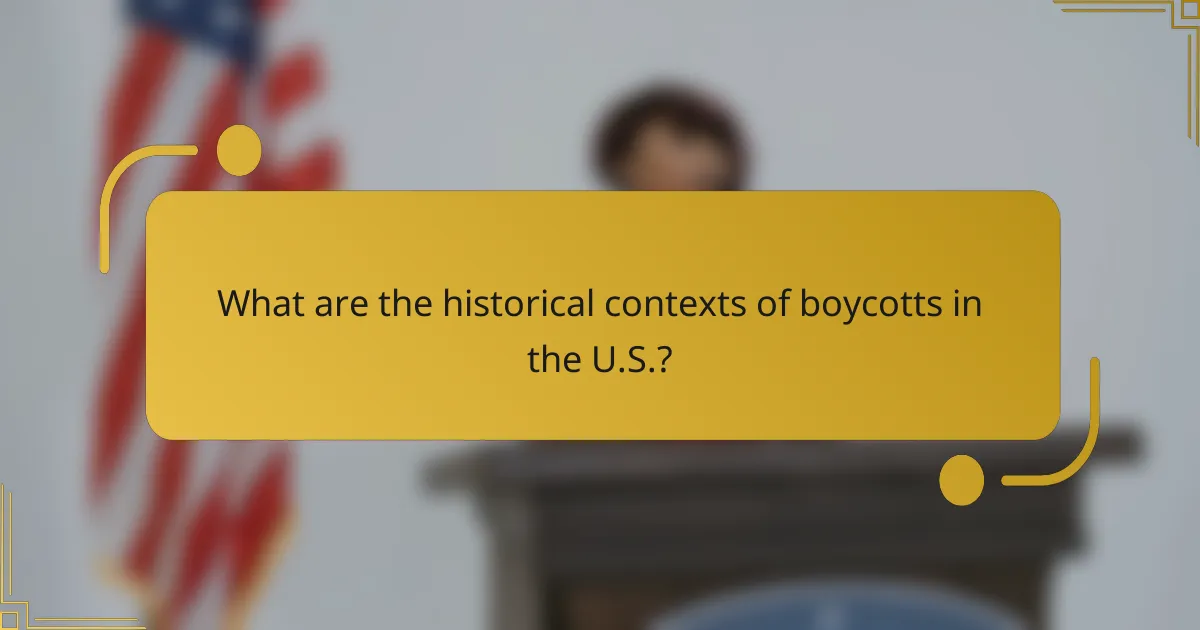
What are the historical contexts of boycotts in the U.S.?
Boycotts in the U.S. have a rich history, often serving as a tool for social and political change. They have been employed by various groups to protest against perceived injustices and to advocate for civil rights, labor rights, and environmental issues.
Notable historical boycotts
Some of the most significant boycotts in U.S. history include the Montgomery Bus Boycott of the 1950s, which was pivotal in the Civil Rights Movement, and the United Farm Workers’ grape boycott in the 1960s, aimed at improving labor conditions. More recently, the boycott of South African goods in the 1980s was instrumental in opposing apartheid.
These boycotts not only raised awareness but also demonstrated the power of collective action, influencing public opinion and policy changes across the nation.
Impact of historical boycotts on legislation
Historical boycotts have often led to significant legislative changes. For example, the Montgomery Bus Boycott contributed to the eventual passage of the Civil Rights Act of 1964, which aimed to eliminate discrimination in public accommodations.
Additionally, boycotts have prompted states to enact laws that protect the right to protest and express dissent. However, some states have also introduced anti-boycott laws, reflecting a complex legal landscape surrounding the right to boycott and its implications for free speech.
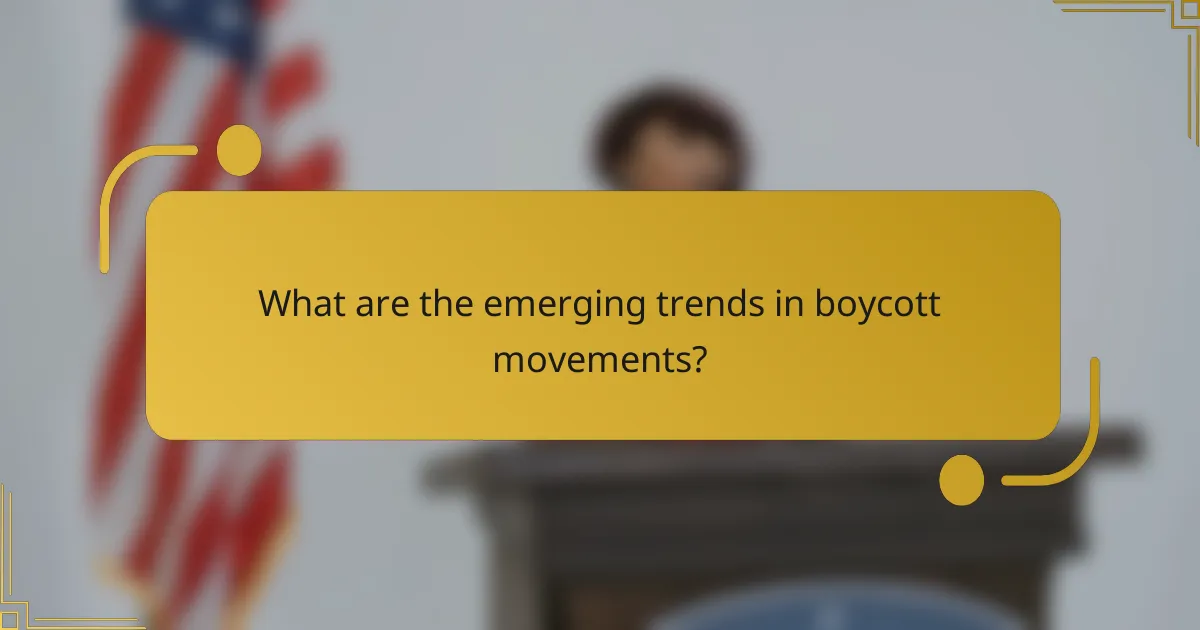
What are the emerging trends in boycott movements?
Emerging trends in boycott movements reflect a growing intersection of social justice, digital activism, and globalization. These movements often leverage online platforms to mobilize support and raise awareness, influencing consumer behavior and corporate policies.
Digital activism and boycotts
Digital activism has transformed how boycotts are organized and executed. Social media platforms enable rapid dissemination of information, allowing activists to reach large audiences quickly and effectively. For instance, hashtags related to specific causes can go viral, amplifying the call for action.
Online petitions and campaigns can also facilitate boycotts by providing easy avenues for individuals to express their support. However, the speed of digital activism can lead to impulsive decisions, so it’s crucial for participants to verify information before joining a boycott.
Globalization and its impact on local boycotts
Globalization has both broadened the scope of boycotts and complicated their execution. Local businesses may find themselves affected by international movements, as consumers increasingly consider global supply chains in their purchasing decisions. This interconnectedness can amplify the impact of local boycotts, as seen in campaigns against multinational corporations.
However, globalization can also dilute the effectiveness of local boycotts. When consumers have numerous alternatives available globally, the pressure on a specific company may lessen. Activists should consider the broader context and potential global reach of their boycott to enhance its effectiveness.
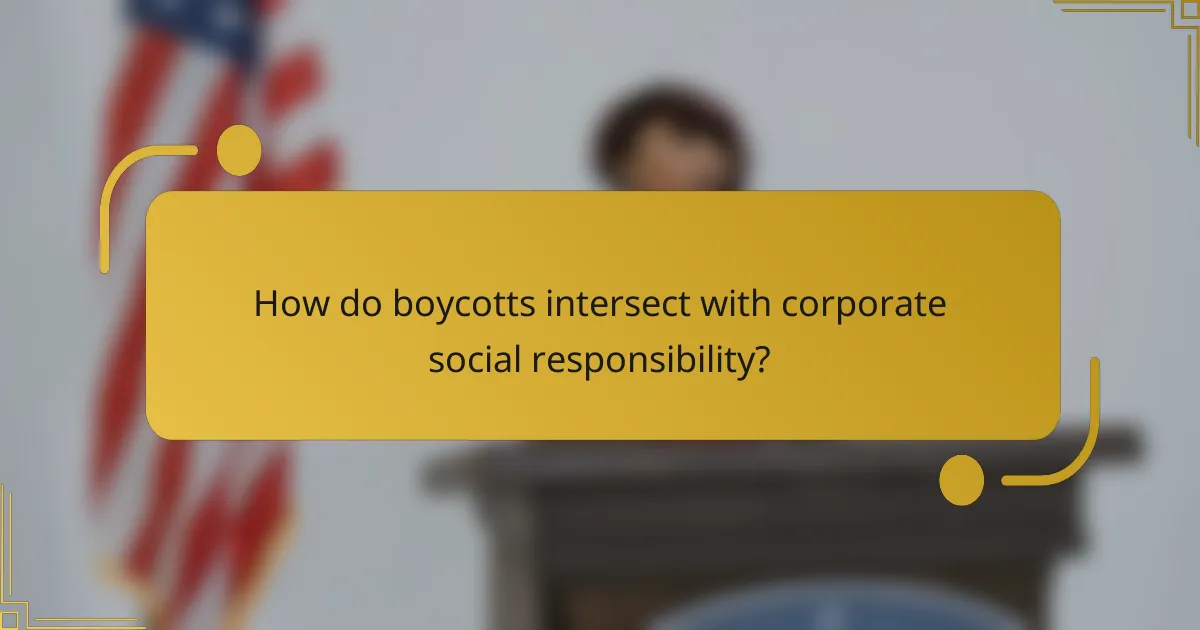
How do boycotts intersect with corporate social responsibility?
Boycotts are a powerful tool that consumers use to hold companies accountable for their social and ethical practices. When a company faces a boycott, it often reflects a failure to meet corporate social responsibility (CSR) expectations, prompting a reassessment of its policies and practices.
CSR policies and boycott responses
Companies with strong CSR policies are better equipped to handle boycotts, as they have established frameworks for ethical behavior and community engagement. A well-defined CSR strategy can mitigate the impact of a boycott by demonstrating a commitment to social values that resonate with consumers.
For example, if a company is boycotted for environmental concerns, a proactive CSR policy that includes sustainability initiatives can help restore consumer trust. Companies should regularly review and update their CSR policies to align with evolving consumer expectations and societal norms.
Consumer expectations and corporate accountability
Consumers increasingly expect companies to take a stand on social issues, making corporate accountability essential. When companies fail to meet these expectations, boycotts can arise as a form of protest, pushing businesses to reconsider their practices and policies.
To avoid backlash, companies should actively engage with their customers and be transparent about their CSR efforts. Regular communication about initiatives, progress, and challenges can foster a sense of trust and loyalty, reducing the likelihood of boycotts. Additionally, businesses should be prepared to respond swiftly and effectively if a boycott occurs, demonstrating a willingness to listen and adapt to consumer concerns.
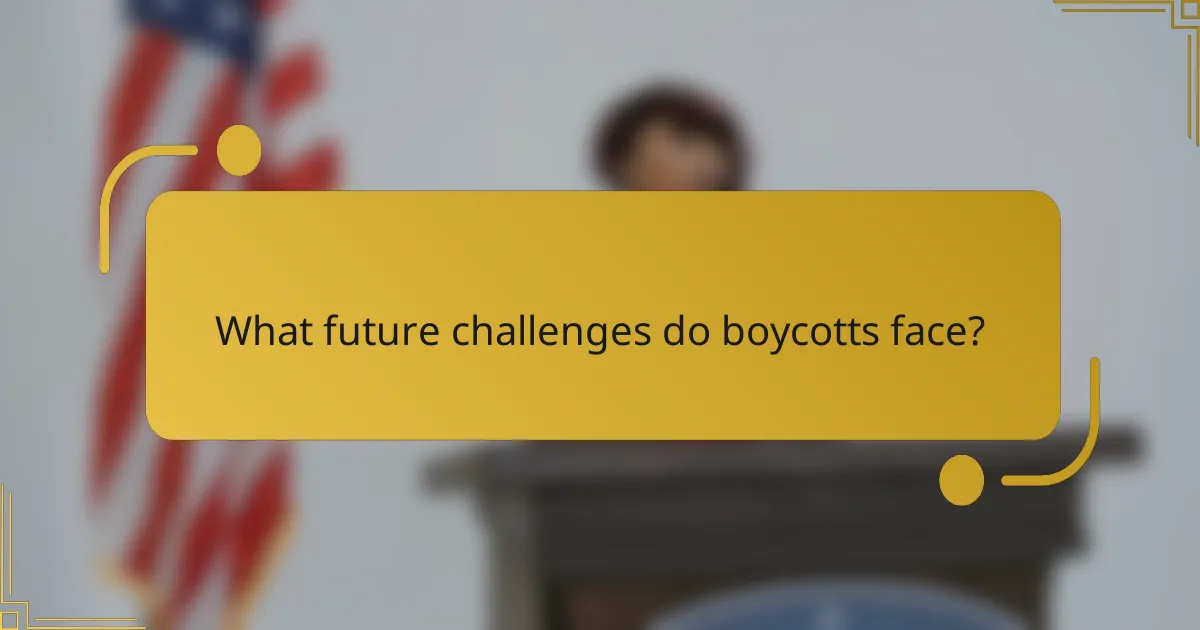
What future challenges do boycotts face?
Boycotts are increasingly facing legal and social challenges that can impact their effectiveness and sustainability. As laws evolve and public sentiment shifts, understanding these challenges is crucial for those considering or participating in boycott actions.
Legal challenges to boycotts
Legal challenges to boycotts often stem from anti-boycott laws enacted in various jurisdictions. These laws can impose penalties on individuals or organizations that participate in boycotts deemed discriminatory or politically motivated, particularly against foreign entities. For example, in the United States, several states have passed legislation that restricts state contracts with companies that support boycotts against Israel.
Participants in boycotts should be aware of the legal landscape in their specific region, as noncompliance with these laws can lead to fines or loss of business opportunities. Consulting legal experts before initiating a boycott can help navigate these complexities.
Social and political backlash
Boycotts can provoke significant social and political backlash, especially if they are perceived as divisive or unjust. Public opinion can sway rapidly, and organizations may face pressure from stakeholders, customers, or the media to withdraw their support for a boycott. This backlash can undermine the original goals of the boycott and lead to reputational damage.
To mitigate potential backlash, it is essential to communicate the reasons for the boycott clearly and engage with supporters to build a strong coalition. Transparency and accountability can help maintain public support and counteract negative perceptions.
Impact of digital platforms
Digital platforms play a crucial role in the organization and dissemination of boycott movements. While social media can amplify messages and mobilize support quickly, it can also lead to misinformation and rapid escalation of conflicts. The viral nature of online campaigns can create challenges in maintaining control over the narrative and ensuring accurate information is shared.
To effectively utilize digital platforms, organizers should focus on creating clear, factual content and engage with their audience regularly. Monitoring discussions and addressing misinformation promptly can help sustain momentum and support for the boycott.
